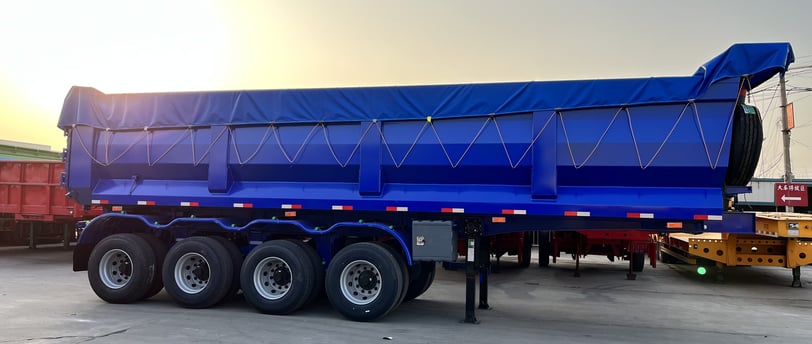How to choose the Right Semi-Trailer?
Choosing the right semi-trailer type is crucial for optimizing your transport operations. Each trailer type is designed for specific cargo and operational requirements, so understanding your needs will help you select the most suitable option for efficient and safe transportation.
5/8/20242 min leer


When choosing a semi-trailer, it's essential to understand the various types available and their specific uses. Each type is designed to handle different types of cargo and operational needs. Here’s an overview of the most common types of semi-trailers:
1. Dry Van Trailers
Description: Enclosed trailers with solid walls, a roof, and a floor. They protect cargo from weather conditions and provide security against theft.
Uses: Ideal for transporting general freight, retail goods, electronics, and non-perishable items.
Advantages: Weather-resistant, secure, and versatile for various types of cargo.
2. Flatbed Trailers
Description: Open trailers with no sides or roof, allowing for easy loading and unloading from all sides.
Uses: Best for oversized or irregularly shaped loads, such as construction materials, machinery, and vehicles.
Advantages: Flexible loading options, accommodates large or heavy items, and can handle loads that exceed standard dimensions.
3. Refrigerated Trailers (Reefers)
Description: Enclosed trailers equipped with a refrigeration unit to maintain a controlled temperature.
Uses: Essential for transporting perishable goods like food, pharmaceuticals, and other temperature-sensitive products.
Advantages: Maintains specific temperatures, preventing spoilage and ensuring compliance with health and safety regulations.
4. Tanker Trailers
Description: Cylindrical trailers designed to transport liquids such as chemicals, fuel, and food-grade liquids.
Uses: Suitable for bulk liquid transport, including gasoline, diesel, milk, and industrial chemicals.
Advantages: Designed to handle the unique challenges of liquid cargo, including weight distribution and safety considerations.
5. Flatbed with Side Kit Trailers
Description: Flatbed trailers equipped with removable side rails or kits.
Uses: Combines the flexibility of a flatbed with added security for taller or bulkier loads.
Advantages: Versatile, offers additional load security, and facilitates easy loading and unloading.
6. Lowboy Trailers
Description: Low-profile flatbed trailers with a lower deck height to transport tall or oversized cargo.
Uses: Ideal for heavy equipment, machinery, and construction vehicles that exceed standard height restrictions.
Advantages: Provides greater stability and safety for transporting high and heavy loads.
7. Step Deck Trailers
Description: Similar to flatbed trailers but with a lower deck height at the front and a higher deck at the rear.
Uses: Useful for transporting tall cargo that cannot fit in a standard flatbed trailer but still needs to be low to the ground.
Advantages: Offers a combination of low height and flatbed flexibility for handling oversized loads.
8. Curtain Side Trailers
Description: Enclosed trailers with fabric sides that can be pulled back like curtains for easy loading and unloading.
Uses: Suitable for various types of cargo where quick access is needed, such as palletized goods.
Advantages: Provides the protection of an enclosed trailer with the convenience of easy access.
9. Double Drop Deck Trailers
Description: Trailers with two lower deck sections and a higher deck in between.
Uses: Designed for extremely tall loads, such as construction equipment and large machinery.
Advantages: Allows for greater height clearance while maintaining a low profile.
10. Auto Haulers
Description: Specialized trailers designed for transporting vehicles, with multiple levels to maximize space.
Uses: Ideal for transporting cars, trucks, and other vehicles from manufacturers to dealerships or between locations.
Advantages: Efficiently maximizes space for transporting multiple vehicles at once.
Conclusion
Selecting the right trailer type involves understanding your cargo needs, operational requirements, and regulatory considerations. By choosing the appropriate trailer, you can ensure safe, efficient, and cost-effective transportation.
Quality
Quality system certification and CCC certification for vehicles.
contact us
Email: abc@halomachinery.com
Wahtsapp: 008613006578074
Wechat: atcn99
© 2001. All rights reserved.
